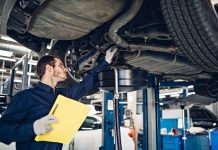We all know the foundation for a great Service, Parts or Body Shop department or any venture really, is excellent employees. But if you are reading this, you’re a Parts, Service, Body Shop manager or other dealership manager who already knows that great employees do not often come ready made. In fact, even in markets where there is significant unemployment, often it’s getting exceedingly difficult to fill positions with quality, if not qualified, people.
Developing People to Achieve More
More and more we find ourselves in the position of needing to develop an employee for a position from an inexperienced candidate. In addition to that, in a dealership environment each position in every department can lead to advancement for employees who show they are willing and able to master their current role.
There’s a huge difference in a person’s value proposition to themselves and the company between someone who can perform the MINIMUM to get by and the TOP PERFORMERS. It’s obvious ongoing performance development is needed in our environment, but often it is easier said than done.
Employee Improvement Plans
Management of the performance of your workers can be one of the most thought-provoking facets of running a dealership or department. Employees have different skill levels, work styles and different needs when it comes to response on their job performance. Performance appraisals and Employee Improvement Plans are usually created by the department manager in discussion with his direct superior or the HR department. There are many reasons why an employee may need a development plan. However, it is generally the performance appraisal results that generate discussion about an employee improvement plan, also referred to as a performance improvement plan.
Interactive Skills
When a member lacks social relationship skills, it may difficult for him or her to work collaboratively with other employees, and more tellingly, have difficulty connecting with customers (if they are in a customer-facing position). When you need your employee to improve their relationships with others, stress the importance of collaboration and support for others work in the employee improvement plan. Activities that require the employee to interact with co-workers on team projects or in small groups is a good way to slowly build your employee’s interpersonal skills. Also, consider books, videos and one-on-one time dealing with customers to show exactly what success looks like by example.
Job Related Competencies
Of all the key performance indicators, an employee improvement plan for improving technical skills is comparatively easy. A needs assessment may be conducted to begin with to determine the specific areas in which the worker needs development. If you are tracking key performance indicators (KPIs) the needs assessment can be glaringly obvious. Upon identifying those areas, the manager can then suggest training, job shadowing and study to rejuvenate or upgrade job skills. Though this may be the easiest area to progress in, it is one of the most essential performance indicators when an employee has sub-par job skills that affect the quality of service your customers receive and the profitability of the department and Dealership.
Inspiration and Enthusiasm
Additional areas managers may notice room for enhancement is the level of motivation a staff member exhibits. A staff who is motivated is also the type who go the extra mile and are fully involved in their job responsibilities. Motivation is shown, or not, in all areas they are accountable for. Absence of motivation, resourcefulness and engagement can be damaging to the department or even the whole Dealership. The Employee Improvement Plan should largely emphasize two things: 1) leveraging each employee strengths/talents, and 2) providing new skills and material that will assist the employee to achieve better in his job. In demonstrating motivation and enthusiasm, it is the Managers place to lead by example. Make sure you engage in the very activities you are nurturing in others every day.
Markers, Milestones and Documentation
An Employee Improvement Plan cannot be operative until the administrator establishes dates or action milestones by which the employee must validate progress. An Employee Improvement Plan must be specific, with clear plans on how and when to accomplish the goals and points. Maintain documentation of the development plan, provide the employee with a copy and file a copy of the plan in the personnel file. This is the type of employment action that requires documentation in the event there is any debate about the existence of a plan or any of the goals identified and achieved.
In summary
The days of hiring a fully trained employee may have all but gone by the way side. We must adapt and train core competencies once we find a candidate with character and basic skill sets. By engaging in proactive employee development, we can very often improve the department’s and Dealership’s Customer Satisfaction Index as well as customer retention and certainly, profitability. This approach also ensures the employee is happy and successful in their role and makes it obvious when it is inevitable that we must reassign or replace an employee who can’t or wont progress.








